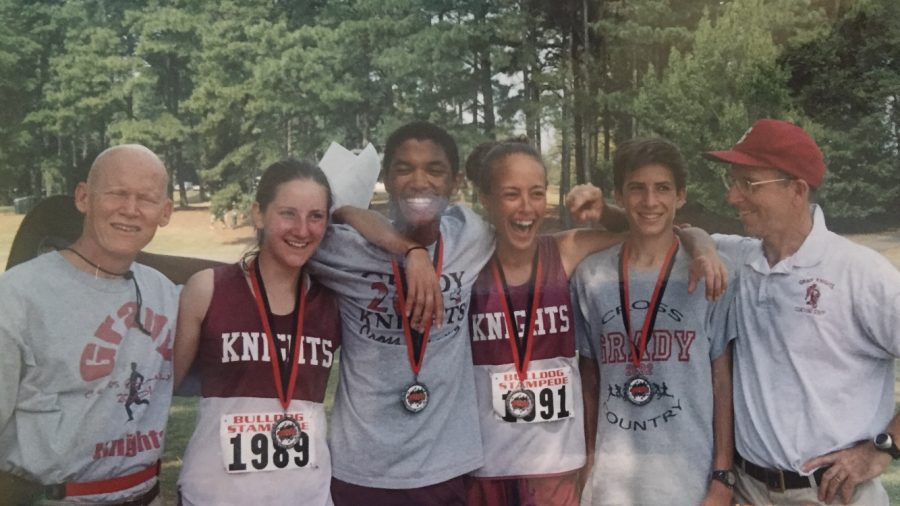Dick Buerkle, former Grady assistant coach and former world indoor mile record holder, passes
(Left to Right): Dick Buerkle, Rebecca Tolmach, Saji Girvan, Kiah Vernon, Nick Stephens, and Jeff Cramer are seen consoling each other after a cross country meet in 2002.
June 26, 2020
Former indoor mile world record holder, Villanova track walk-on, and Grady assistant cross country and track coach Dick Buerkle, passed on Monday, June 22 from Parkinson’s Disease.
Buerkle, who was 72, qualified for both the 1976 Olympic Games held in Montreal and the 1980 games that were held in Moscow that were eventually boycotted by the United States. In addition, in 1978, he broke the indoor mile record with a time of 3:54.93.
Head cross country coach Jeffrey Cramer, who became head coach in 1998, was acquainted with Buerkle well before he had joined Grady as a coach. Buerkle coached at Grady from 2002 to about 2007.
“I knew him from way back from the Atlanta Track Club, starting back in the early 80s when he just moved to Atlanta [in 1980],” Cramer said. “I met him right away at road races. He was way faster than I was, but I was respectable enough to where I could carry a conversation.”
Although Buerkle was very prominent in Atlanta’s running community when he was hired at Grady, his number one priority was teaching.
“[When he joined Grady,] in the back of my mind, I started worrying that he was maybe going to be a threat to take my spot as coach,” Cramer said. “He was very, very clear that he wanted to come in and do a good job as a teacher; that was the main thing he wanted to do.”
Buerkle became a Spanish teacher at Grady and even taught some of the athletes on the cross country and track team.
Saji Girvan, 2005 graduate and state runner-up in cross country and in the 800 and 1600 in track during his senior season, not only saw Buerkle in the classroom, but also on the track.
“Buerkle wasn’t just my coach; he was my Spanish teacher and a mentor of sorts,” Girvan said. “He sent me to Spain [for an exchange program] in the middle of my training, and it kind of changed my life.”
When Buerkle first joined the team as a coach, Girvan and the rest of the team were unsure of how they felt about his coaching tactics and ability.
“We switched to Buerkle in the middle of beginning to become runners, and at first, we were kind of skeptical,” Girvan said. “We didn’t fully understand his pedigree, but this was a guy that, when we were running, he was like in his 50’s, and if he had been training at the time, he would have been just as fast as us.”
According to Girvan, Buerkle had more of an old school mindset, and so the team had to adjust to his new coaching approach.
“He believed in getting out there and running,” Girvan said. “Just logging the miles; doing it as safe as you can. He wasn’t into super high techy things; he was about doing a classic practice format and hitting it hard.”
Cramer also noticed Buerkle’s high intensity practice tactics. He noticed it was difficult for some of the kids to handle it.
“He was always very intense with the kids on the team; he was always interested in having them do just a little bit more,” Cramer said. “Some of the kids bought into it, and some kids didn’t, but once he got a core group of five or six kids that really bought into it, then he could bring them along.”
Not only was Buerkle’s approach to running different, his way of thinking and philosophy of the sport played a large role in his coaching. Six-time state champion in cross country and track and 2005 alum Nick Stephens explained that even though Buerkle’s unique approach to coaching was effective, it was still difficult to adjust to.
“He was definitely a different coach than Cramer; he had a lot of actual deep philosophical theories about running,” Stephens said. “He was very big on positive mental visualizations, and he started to do this with us before races. It was definitely interesting, and I think it was effective.”
Because of Buerkle, the team’s warmups and preparations changed dramatically. The team would not only stretch but warm up their minds to the idea of the race ahead.
“One of the things he used to do with us was where we would just lie on the grass and he would kind of narrate the race, and he told us to imagine the race going exactly how you want it to go,” Stephens said.
Stephens also remembers a very distinct technique that Buerkle would teach them to use during the race.
“One thing I just remember very distinctly: he would always talk about imagining that there was a rope in the center of your chest that was pulling you forward,” Stephens said. “And if there was someone ahead of you, the rope would be attached to them, and you were just following that rope.”
Buerkle’s coaching not only helped the state of the team while its members were in high school, but also put Stephens and Girvan on the recruiting map for countless colleges interested in them.
“Buerkle’s coaching was so good. That it in itself was a signifier to college programs of how good we were,” Girvan said. “That’s why Nick and I were so heavily recruited; it wasn’t just that we were good; it was also that people knew under Buerkle, we weren’t being coached poorly.”
Buerkle’s coaching approach was also unique to colleges interested in recruiting Stephens and Girvan.
“[In a college’s perspective], we were being undertrained; we were getting quality over quantity which, for a kid, was very important,” Girvan said. “It wasn’t about running us into the ground. It was about us, our minds and our bodies being able to be the best they can be at any given moment.”
After high school, Girvan used lots of Buerkle’s stories, running tactics and overall mentality when participating in an old-school style of collegiate cross country.
“I went to school at the London School of Economics, and when I was there, I really felt a deep connection to Buerkle,” Girvan said. “I got to run in the European style of cross country, which is very old school. I was very prepared for that from the stories I had been told and the way I had been trained.”
Buerkle not only vastly improved the members of the team’s ability to run, he also improved Cramer’s approach and ability to coach future athletes for the team.
“[Some] of the things that he told me is how to work on personal feelings, pay attention to what the kids are saying, and listen to stories,” Cramer said. “Training more based on how the individual is feeling rather than sticking to a very strict training schedule.”
Not only did Buerkle’s coaching and philosophy have an affect on Cramer’s abillity to coach cross country, he also had a lasting impact on boys head track coach Delbert Ellerton.
“He didn’t focus on winning and losing but on athletes doing their best by setting goals and striving to achieve them,” Ellerton said. “I will always be grateful for what he taught me as a coach and person and for his contributions to our athletes.”
Although Buerkle had great success in his past running career prior to coaching, he didn’t let that get in the way of his training.
“He was incredibly humble in the way [that] he never talked about, or I can hardly remember [him] ever talking about, his own personal success,” Stephens said. “It was pretty crazy. He just didn’t really bring it up, and I think that’s just who he was. We all knew he achieved great things in his career, but it was never really the focus.”
Buerkle’s coaching and philosophy of life stuck with Girvan well after his high school running career.
“I view him as really my running father,” Girvan said. “And as somebody that’s been such a serious distance runner, it really shapes your mentality and approach to life and how to be successful and how to approach the ups and down and the suffering and joy of life.”
Though Buerkle had a very strict and stern approach to coaching and running, he had a soft side that tried to connect with the members of the team. Stephens recalls an event where Buerkle had shown his fun side that resonated with him.
“One of the best memories I have of him was when I suggested we jump in the lake at Piedmont Park,” Stephens said. “Buerkle heard and was like, “yeah let’s do it,” and I think we were all surprised, but we all went to that dock, and he was ahead of the pack, and he leaped off into the water.”








Scott Stephens • Jul 3, 2020 at 9:46 am
William, I enjoyed your article on Buerkle very much. You did a nice job of integrating quotes into your piece. I knew Dick well as a colleague at Grady and as a friend after he left. He was an extraordinary athlete and person.